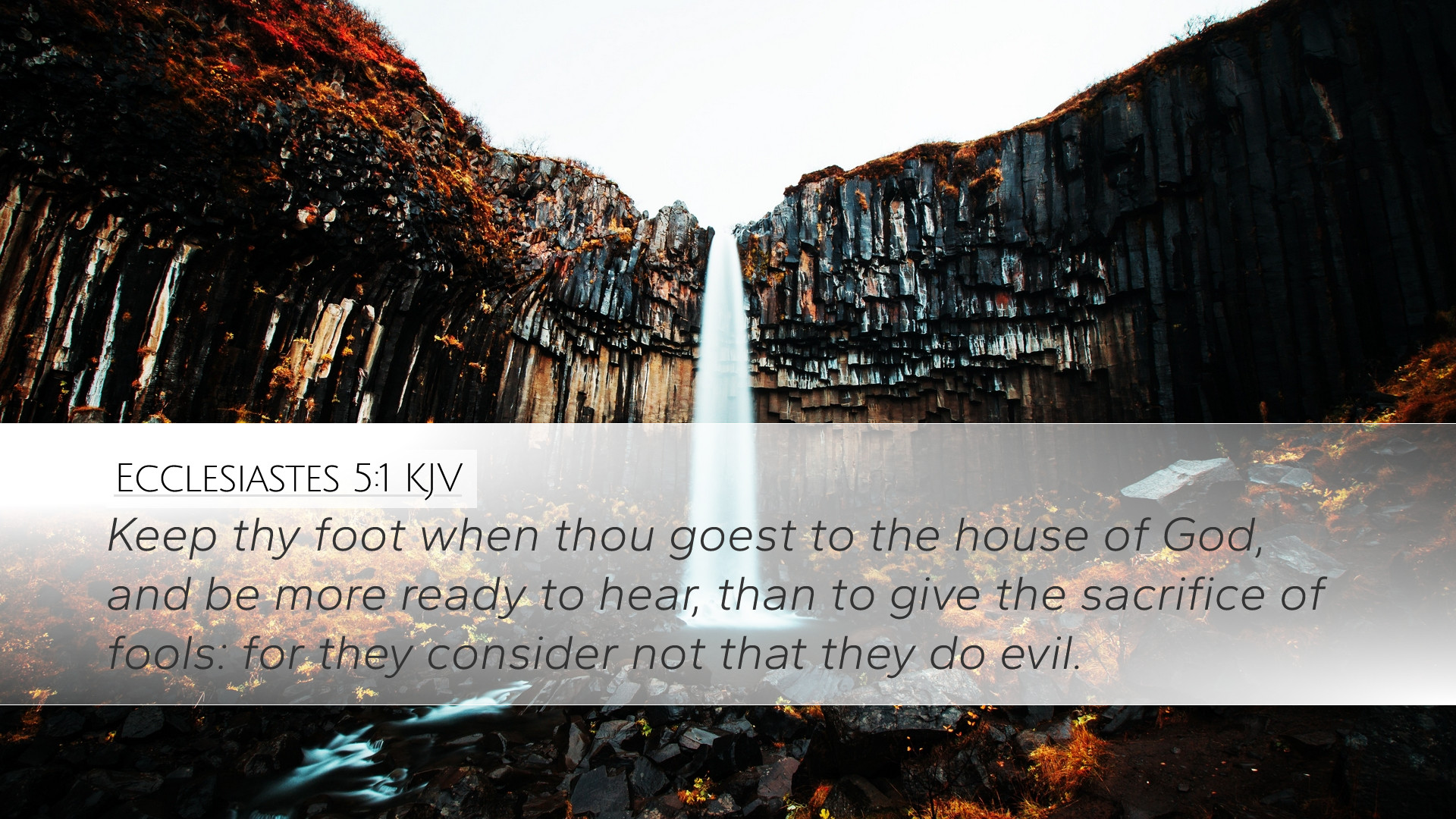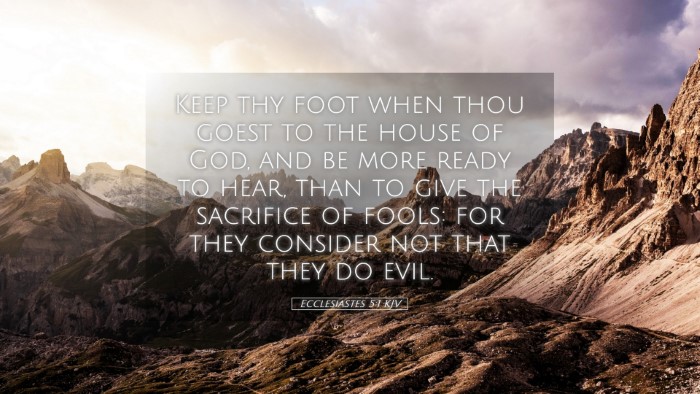Commentary on Ecclesiastes 5:1
The verse Ecclesiastes 5:1 states, "Guard your steps when you go to the house of God. Go near to listen rather than to offer the sacrifice of fools, who do not know that they do wrong.". This verse calls the worshiper to a sober and reflective attitude in the presence of God.
Contextual Background
Ecclesiastes is traditionally attributed to King Solomon, a figure renowned for his wisdom. This book explores the meaning of life and the futility of worldly pursuits. In the context, the opening verses of Chapter 5 speak to the nature of worship and the approach one should take when entering the house of God.
Insights from Public Domain Commentaries
Matthew Henry's Commentary
Matthew Henry emphasizes the importance of reverence in worship. He points out that when one approaches God's house, it is essential to be mindful of one's conduct and motives. The phrase "Guard your steps" serves as a directive to approach God with a cautious heart, understanding the sacredness of the moment.
Moreover, Henry warns against the "sacrifice of fools," advising that empty rituals devoid of understanding serve no spiritual purpose. Worship should not be a mechanical act, but rather a genuine expression of one's heart and mind towards God. He highlights that those who rush into God’s presence without reflection often fail to understand the weight of their actions and the seriousness of their offering.
Albert Barnes' Notes on the Bible
Albert Barnes echoes Henry's sentiments and expands on the concept of preparation for worship. He notes that entering into God's presence should involve a spiritual readiness and a desire to hear and obey. Barnes explains that listening, as mentioned in the verse, is paramount; it implies that the worshiper should come with a heart prepared to receive God's wisdom rather than merely to perform rituals.
Barnes also remarks on the "sacrifice of fools," equating it to the sacrifices made without true understanding or a contrite heart. He asserts that such behavior is not merely foolish but dangerous, as it reflects a disregard for God's holiness and authority. It further illustrates a disconnect between one’s inner disposition and outward expressions of faith.
Adam Clarke's Commentary
Adam Clarke takes a slightly different angle, emphasizing the importance of listening over speaking. He posits that in God’s presence, humanity should prioritize hearing God’s voice over offering elaborate prayers or sacrifices. Clarke notes that our words can lead to deception, whereas God's guidance brings enlightenment and correction.
Clarke also discusses the social context of the time, where sacrifices were often made as acts of piety. He cautions against the ritualism that can characterize religious behavior, pointing out that following traditions without understanding their significance leads to spiritual emptiness. This aligns with the overall theme of Ecclesiastes, which critiques the vanity of human endeavors.
Theological Themes
Several theological themes emerge from Ecclesiastes 5:1:
- Reverence and Awe: The call to guard one’s steps signifies the need for reverence when approaching God, acknowledging His holiness.
- True Sacrifice: The emphasis on genuine sacrifices points to the importance of authenticity in worship rather than mere ritual.
- Listening to God: The act of listening is portrayed as a necessary posture for worshippers, fostering a relationship of communication with God.
- Self-Examination: The verse invites a period of self-reflection before conducting oneself in communal worship, prompting an assessment of one's spiritual state.
Practical Applications
For pastors, theology students, and scholars, Ecclesiastes 5:1 provides several practical applications:
- Preparation for Worship: Establishing a liturgical framework that emphasizes preparation, such as prayer and meditation, before services can enhance the worship experience.
- Teaching on Sacrifice: Educating congregations on the meaning of sacrificial offerings can lead to a more profound understanding of worship and devotion.
- Encouraging Listening: Initiating programs that focus on listening to God's Word can help counteract the prevalent tendency to prioritize speaking over receiving.
- Promoting Reflection: Creating spaces for reflection before worship services can help congregants examine their hearts and minds.
Conclusion
Ecclesiastes 5:1 serves as a crucial reminder of the sanctity of worship and the posture of our hearts as we approach God. By marrying the insights from Matthew Henry, Albert Barnes, and Adam Clarke, one can appreciate the depth and richness of this verse. May we endeavor to guard our steps and cultivate a heart that seeks to listen, ensuring that our worship is not just routine, but a transformative encounter with the Divine.


